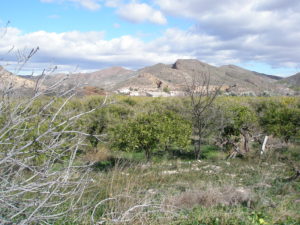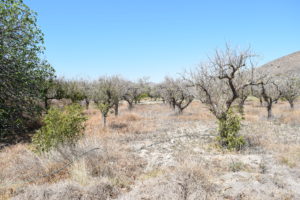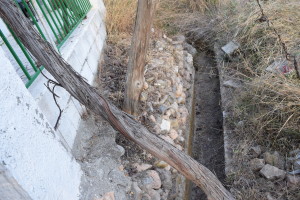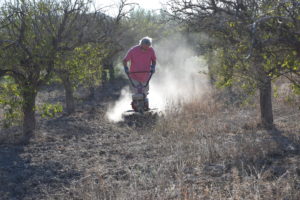A recent TV programme referred to where we live as the back of beyond and in the desert. While I would disagree with both descriptions, we do have very little rain here. The only proper desert in Europe is about an hour down the road. The last rainfall of any significance here was last September, and before that, probably the year before. Any benefits from it had long since disappeared.

This was last spring, and it has had a year of drought since then!
Our trees are looking a little sorry for themselves. (Litotes is alive and well, however!) The locals have told us on several occasions that we need to water them, as they are dying, but the previous owner of the house sold the irrigation rights before she sold to us, so we had no way of watering anything.
We have an acequia running past the house, and would watch the water flowing on its way to other people’s land, but our single sluice is silted up, and clearly has been out of service for years. In its heyday, this sluice would have opened to allow water from the acequia to flow down a long trench – now overgrown and full of dead foliage – and onto the land, via a system of smaller trenches and banks. Some of the larger operators in the area have black plastic tubing and drips, but many still use the traditional method to flood sections of land within mud banks. We favour trying the simple, traditional method, especially as our canine friends love eating plastic irrigation pipe.
We have spent months trying to get to the bottom of how exactly we would go about obtaining agricultural water, but the system here is rather confusing for a foreigner to understand.

Heartbreaking, eh? May 2016
We discovered that in order to water, you have to buy into a cooperative, and then you buy the water by the hour. This sounds delightfully simple, but the matter was confused for us by the fact that they call the shares in the cooperatives hours, and these hours did not immediately seem to translate into actual hours of water supply. Our interpreter would ask a question, repeat the answer back to the person concerned, and be told ‘No, it isn’t an hour – it’s an hour.’ Or ‘No, not €3,000. €3,000’ Every time we thought we had got to the bottom of this arcane system, something would be said that made it clear that it was not clear!
We knew we had to do something about our poor trees, no matter how complicated things might be, but it took us months to find a local cooperative, and the money the contact we had was asking was ludicrous. Neighbours seemed doubtful that what he was offering would even be sufficient to water the land we have. We tried to find out if the price was as unreasonable as it sounded, but they had all bought their hours years ago, in pesetas. They advised us to be careful not to be stitched up, but could tell us little more, so we resigned ourselves to a longer search.

I cleaned out the acequia last August. You can read about it here
Chatting to one of the daughters of an elderly neighbour, I asked if they would think of selling us part of their ‘hours.’ She replied that although they had more than enough, they did not need the money, and were not going to be selling any. She said she would mention it to her husband, and that was the end of that.
The months passed, and various elderly Spanish gentlemen working on the neighbouring orange, lemon and olive groves told me I needed to get water. None of them could offer any information, but they were all very good at sucking their teeth and giving a very poor prognosis for our trees.
‘I guess we shall have to bite the bullet and pay whatever Jesus says is the price,’ I groaned. (I find it hard to get used to so many locals being called Jesus, but nobody bats an eyelid here.) Geoff was not keen, but when he took a walk around the land a few weeks back, he was horrified. We debated trying to use water from the house, and whether the local authority would take a dim view of using drinking water, assuming it was even possible to do. The days were getting longer, the temperatures were rising, and we had to do something before the 40 degree summer months set in.
Then one evening, Juan, the son-in-law of our elderly neighbour appeared outside.

Geoff rotavating, ready for watering. Note the dust cloud – this land is parched!
‘Juana said you want water. I know someone who wants to sell five hours, if you are still interested.’
Interested? Having an alternative to Jesus’ offer was an extraordinary thrill! He tried to explain where this person lived, but I was not sure I had understood. I asked him if he had any contact details, and he said he would get back to me.
The next day, another man turned up on the doorstep. It turned out he was Juan Jose, and it was he who had the spare hours to sell. It soon became obvious that my Spanish was not up to the conversation we would need to have, so I asked for his number, and arranged for our interpreter to call him.
To cut a long story short, and I will tell you about Juan Jose another time, we successfully negotiated and completed the complicated process of buying six hours from Juan Jose three days ago. It has poured every night since.

